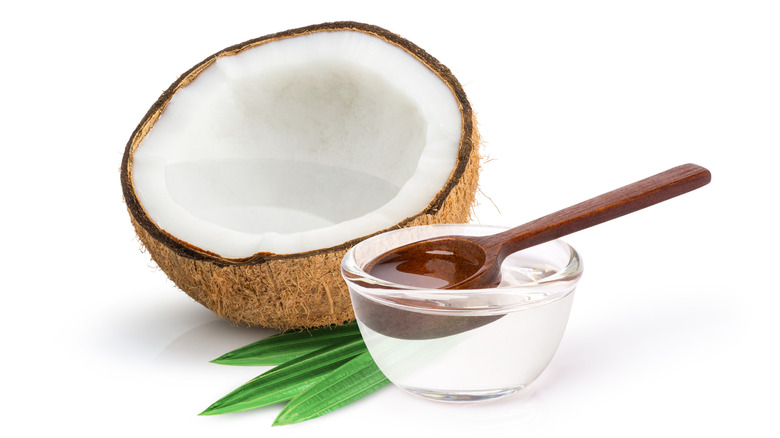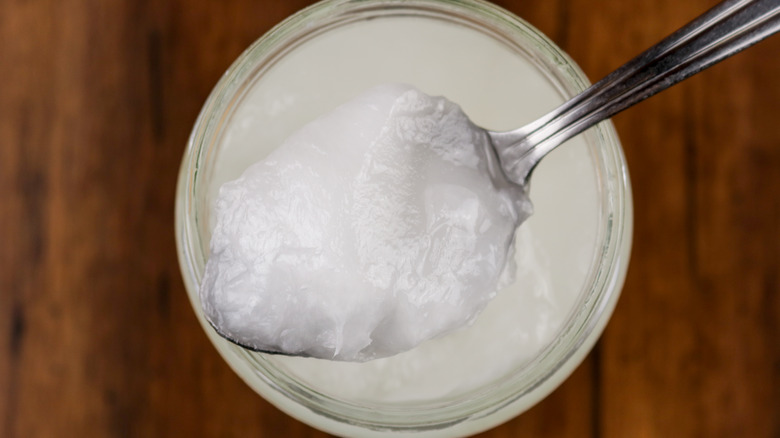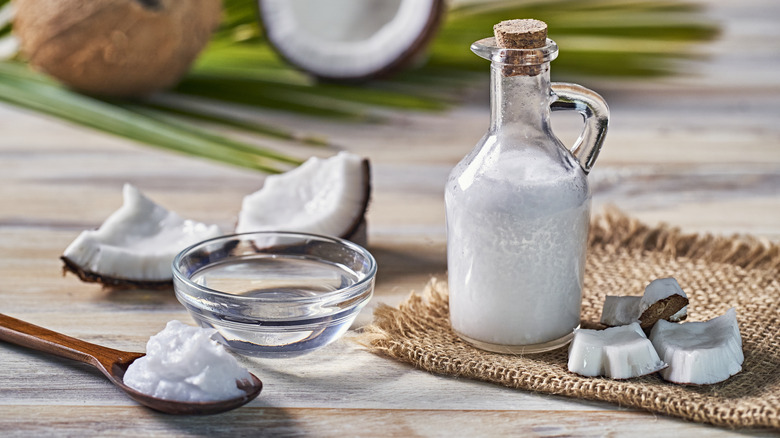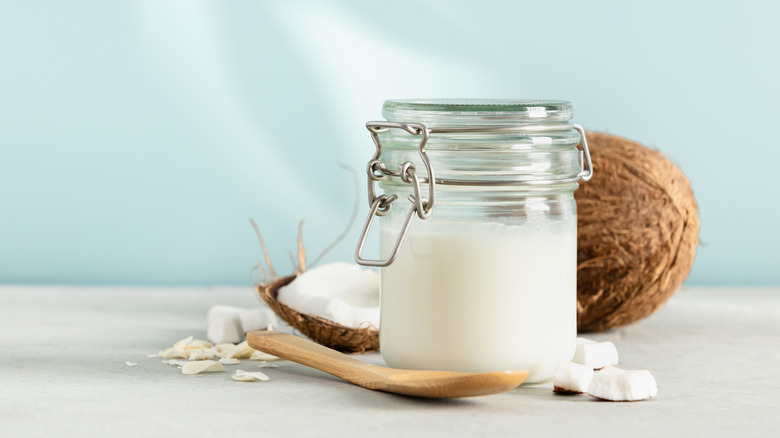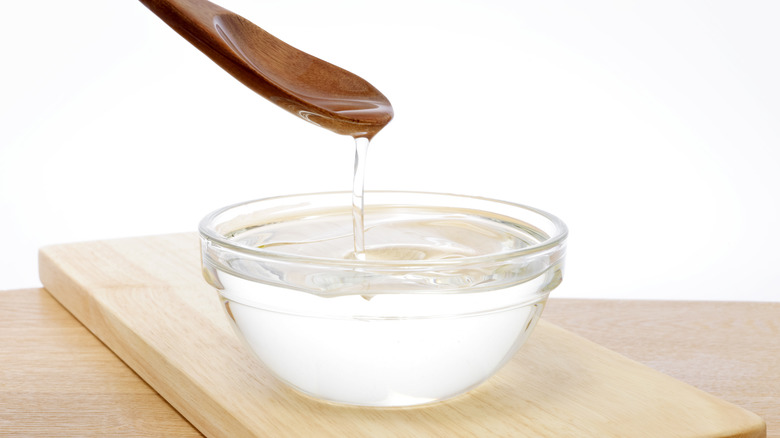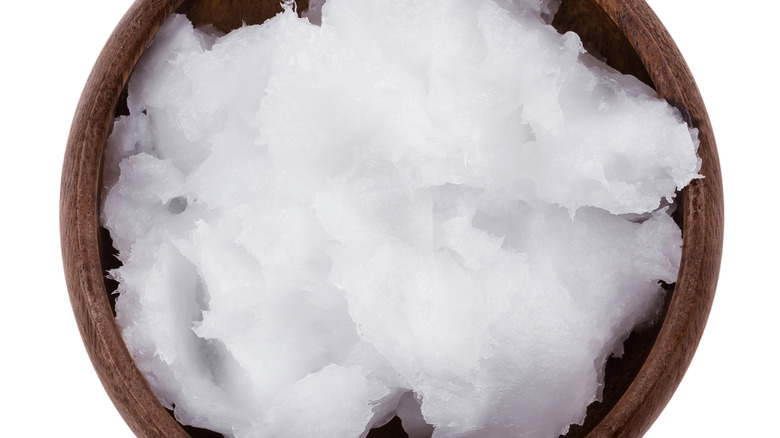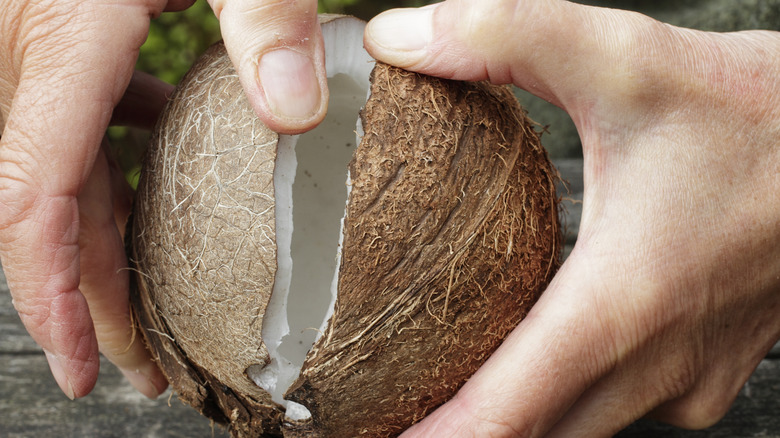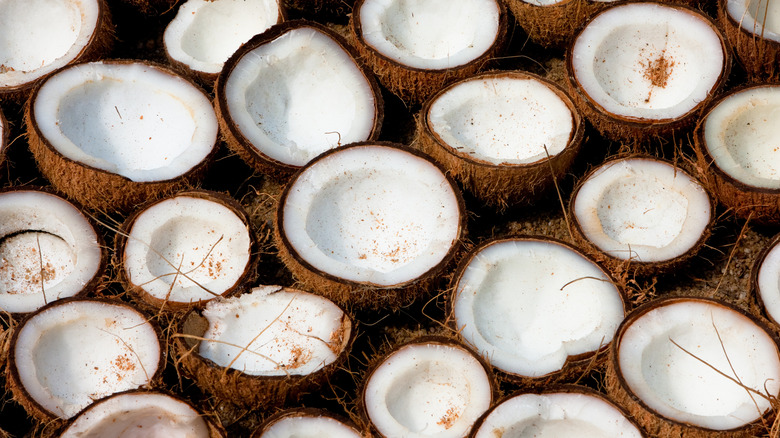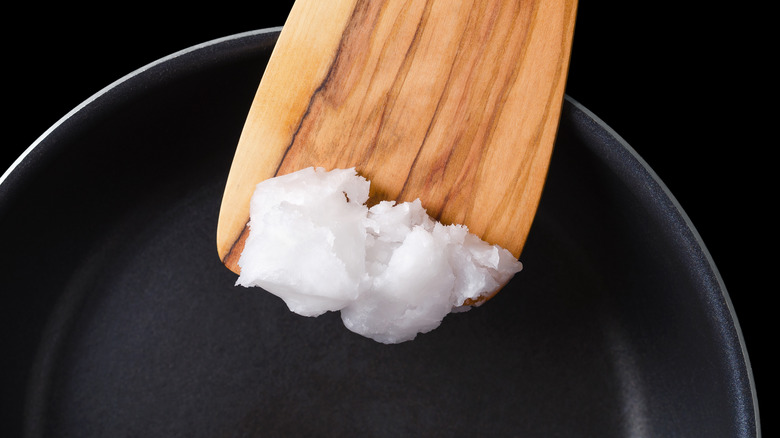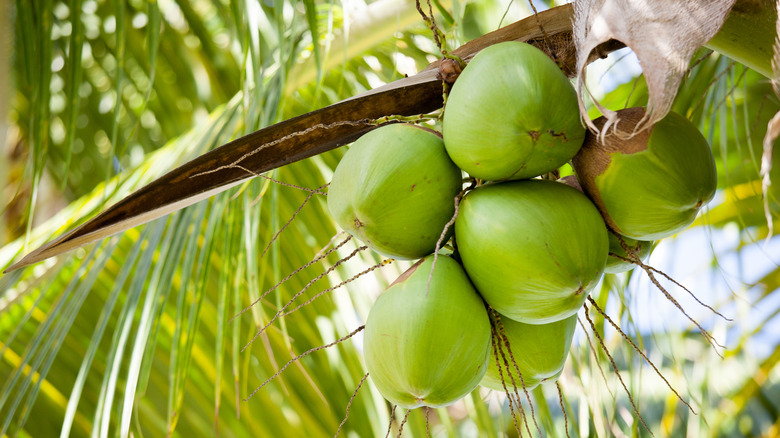False Facts About Coconut Oil You Thought Were True
Coconut oil has risen in popularity as an alternative to common oils in the last decade or so. It's also been hailed by many as a superfood. Claims about coconut oil's miracle-working properties as a beauty product are also rife, meaning that it's sometimes made its way into our bathroom cabinets, too. However, amidst all this hype, plenty of misinformation about coconut oil has also emerged.
Whether it's claims about coconut oil's use as a weight loss aid or misconceptions about its environmental footprint, we're here to explore the common myths surrounding this potential wonder food. From its nutritional value to its uses in and out of the kitchen, we've separated the fact from the fiction. Join us as we reveal the truth behind the coconut craze. Whether you're a health enthusiast, a keen home cook, or are simply curious, here are some false facts about coconut oil that we're about to bust.
False: It's low in saturated fat
Coconut oil is often viewed as a healthier alternative to other fats like vegetable oil or butter, and you might automatically assume this is because it's lower in saturated fat. However, when putting it up against other fats and oils, coconut oil actually contains one of the highest levels of saturated fat of the bunch.
Compared to butter (which contains about 64% saturated fat), and lard (40%), coconut oil sits high on the list, consisting of about 90% saturated fat. Vegetable oil and olive oil contain far lower percentages of saturated fat, at 7% and 14%, respectively.
Saturated fats have been linked with cardiovascular issues, but it's important to remember that this sort of fat comes in different forms. Research suggests that the types of saturated fat present in coconut oil are processed differently by the body, making them a potentially healthier energy source than those found in fats like butter and lard.
False: There's only one type of coconut oil
Contrary to popular belief, coconut oil doesn't come in just one form. Instead, there are two main types of coconut oil available on the market: refined and unrefined. Refined coconut oil is processed using methods such as bleaching (which here is really a form of filtering) and deodorizing via heat to remove impurities and neutralize the flavor. This process results in a product with a higher smoke point and more neutral taste, making it suitable for cooking and baking at higher temperatures.
Unrefined coconut oil (also known as virgin coconut oil) is made from fresh coconut meat using methods like cold-pressing, which works without heat or chemicals. This preserves more of the natural flavor and aroma of the coconut. Unrefined coconut oil is prized for its purity and is often used in raw food recipes, as a flavor enhancer in cooking, and in skincare and haircare products.
Despite their differences, these two types of coconut oil are nutritionally similar, meaning they contain similar levels of MCTs and saturated fats. Whether you're looking for a neutral cooking oil or a pure, flavorful addition to your culinary creations or skincare routine, there's a type of coconut oil to fit your needs.
False: It goes bad quickly
If you thought coconut oil had a short shelf life, you're mistaken. When stored properly, coconut oil can remain fresh and stable for an extended period of time. That's because coconut oil is resistant to oxidation due to its high saturated fat content, making it less prone to spoilage compared to oils high in polyunsaturated fats. While coconut oil may solidify or liquefy depending on the ambient temperature, this is a natural occurrence that doesn't indicate spoilage.
Coconut oil is more stable when it is properly stored in a cool, dark place away from direct sunlight and heat sources. Keeping it tightly sealed in its original container or airtight jar to prevent exposure to air and moisture will also prolong its shelf life. Avoid using wet or dirty utensils when scooping out coconut oil, as this can introduce bacteria into the jar. If you notice any signs of spoilage in your coconut oil, such as a rancid smell, odd taste, or unusual coloration, it's best to toss it.
Stored correctly, refined coconut oil can maintain its freshness and quality for up to 18 months, while its unrefined counterpart can last up to three years. So, rest assured that your coconut oil can remain a reliable staple in your pantry for the long haul.
False: It stays solid unless you actively try to melt it
If you live somewhere with a cooler climate, you might only have encountered coconut oil in solid form when stored in your cupboard or pantry. However, a common misconception about coconut oil is that it always remains solid at room temperature and requires effort to melt.
In fact, it may do all the work on its own. Coconut oil has a melting point of around 76 degrees, so its state depends on the ambient temperature. At temperatures below its melting point, coconut oil solidifies into a creamy, semi-solid consistency, making it easy to scoop and measure. However, as the temperature rises above 76 degrees, coconut oil transitions into a clear liquid similar to other vegetable oils. If you live in a warmer climate or you're experiencing a temporary heatwave, you might notice that your coconut oil has melted. If you prefer to liquify your oil before cooking, you can gently warm the jar in a bowl of warm water (which should prove safer than attempting to microwave it).
False: It's unhealthy
Due to its high saturated fat content, there some concerns around coconut oil's health impact. Saturated fats have long been associated with elevated cholesterol levels and an increased risk of cardiovascular disease. However, the type of saturated fats found in coconut oil differs from those found in animal products such as butter and lard. It's important to note that not all saturated fats are created equal. The predominant fatty acid in coconut oil is lauric acid, which is a medium-chain triglyceride (MCT). Unlike the long-chain triglycerides (LCTs) found in many animal fats, MCTs are more rapidly absorbed and transported to the liver, where they are used as a quick source of energy or converted into ketones.
Research suggests that MCTs may have several health benefits, including improving cognitive function and boosting energy levels. Additionally, coconut oil contains antioxidants and antimicrobial compounds, further contributing to its potential health-promoting properties.
So, yes, coconut oil is high in saturated fat, but labeling it as unhealthy solely based on its saturated fat content oversimplifies the issue. As with consuming any type of fat, moderation is key, and incorporating coconut oil as part of a balanced diet can be a nutritious choice.
False: Its uses are limited to cooking
Coconut oil's versatility extends far beyond the confines of the kitchen. While cooking remains one of its primary uses, this oil has also found its way into our skin and haircare routines, cleaning supply cupboards, and beyond.
Firstly, coconut oil is a popular natural skincare remedy that is known for its moisturizing properties. It can be used as a gentle makeup remover or as a hydrating, soothing treatment for dry skin anywhere on the body. It also has a reputation as an effective hair conditioner, thanks to its ability to penetrate the hair shaft (though it may leave hair looking oily). It can be used as a pre-shampoo treatment or a styling aid to tame frizz and add shine.
Furthermore, oil pulling, a traditional Ayurvedic practice, involves swishing coconut oil in the mouth to promote oral hygiene. More widely, coconut oil is a versatile base for homemade products, including lip balms, body scrubs, and soaps. Its emollient and antibacterial properties make it a valuable ingredient in DIY formulations.
Beyond personal care, coconut oil can be utilized in many other ways around the house. Keep a jar on hand for polishing furniture, lubricating squeaky hinges, removing sticky residues, or conditioning wooden cutting boards.
False: You have to keep it in the fridge
There's no need to keep your coconut oil chilled. While refrigeration can slow down the oxidation process and prolong the shelf life of certain oils, coconut oil is an exception due to its unique composition and stability. Coconut oil is predominantly composed of saturated fats, which are more resistant to oxidation compared to the polyunsaturated fats found in many other oils. This makes coconut oil less susceptible to spoilage, even when stored at room temperature.
In fact, refrigerating coconut oil presents some disadvantages, such as causing it to solidify into a hard mass which can then be inconvenient to use. To maintain the quality of coconut oil, it's best to store it in a cool, dark place like a kitchen cabinet or pantry. Keep the container of coconut oil tightly sealed to prevent air and moisture from compromising the oil's freshness.
False: You can't make it yourself at home
Though grabbing a jar of coconut oil from the grocery store might seem a whole lot more convenient, it is indeed possible to make high-quality coconut oil in your own kitchen. Moreover, homemade coconut oil offers the satisfaction of crafting something from scratch.
All you need to make your own batch of coconut oil is whole coconuts and water. First, remove the white coconut meat from the hull, then shred it into small pieces in a blender or food processor. Add water and blend it all up to make a creamy liquid.
Then, strain the blended mixture using a cheesecloth or nut milk bag. Add the liquid to a pan and simmer on low heat until the solids separate from the oils, which can take a couple of hours. Then, all that's left to do is strain out the solids and transfer the oil to a jar. It should solidify as it comes to room temperature, but you can pop it in the fridge to speed this up if necessary.
False: You can't eat it if you have a nut allergy
Despite the name, coconuts are actually fruit from the coconut palm. Therefore, individuals with tree nut allergies are not necessarily allergic to coconut oil. Coconut allergies are relatively rare. Of course, anyone who really is allergic to coconuts should avoid consuming coconut products, but most individuals with tree nut allergies can use coconut products without experiencing any adverse reactions.
However, as with any food, individuals with severe allergies should carefully read product labels and avoid anything that may contain traces of tree nuts due to cross-contamination during manufacturing. That said, many brands of coconut oil state they are produced and packed in a nut-free environment.
If you suspect an allergy to coconut or any other food, seek medical advice for a proper diagnosis. Your doctor will be able to provide the best guidance on how to manage an allergy and which foods you can safely eat.
False: You can't use it for frying
Coconut oil may be high in saturated fats, but this doesn't render it unsuitable for frying. In fact, coconut oil is an excellent choice for frying, offering both flavor and stability at high temperatures. Due to its high smoke point, coconut oil is suitable for sautéing, frying, and even deep frying. Refined coconut oil, in particular, has a smoke point of around 350 degrees, comparable to other commonly used cooking oils like vegetable and canola oil.
Coconut oil's high saturated fat content also means it remains stable at high temperatures, preventing it from breaking down and forming harmful compounds during frying. This makes coconut oil a healthier option for frying compared to oils high in polyunsaturated fats, which are more prone to oxidation. Of course, it's still frying and coconut oil still contains saturated fats, so moderation is a good thing to keep in mind.
Less refined coconut oil also brings a subtle flavor to fried foods, imparting a hint of coconut aroma without overwhelming the dish. This can enhance the taste of various cuisines, from Asian stir-fries to Caribbean-inspired dishes.
False: It's always more environmentally friendly than palm oil
While coconut oil production does have certain advantages over palm oil, it is not without its own environmental considerations. Firstly, coconut palms have a lower oil yield compared to oil palm trees. This means more land may be required to produce the same amount of oil, leading to greater pressure on land resources and deforestation if not managed sustainably. Furthermore, in some regions, coconut cultivation has expanded at the expense of natural habitats, and there have been concerns about the loss of biodiversity and disruption of ecosystems.
Despite these factors, it's not all bad news. Coconut cultivation may have a lower overall impact on biodiversity and habitat destruction than other crops. Unlike large-scale monoculture plantations commonly associated with palm oil production, coconut cultivation often occurs on smaller-scale farms. Coconut palms can be more easily integrated with other crops, such as bananas and cacao. This maximizes land productivity and farmer's income while reducing the environmental impact of agriculture. Farming coconut also provides livelihoods for small-scale farmers and can help to provide financial support for rural communities.
False: It will help you lose weight
Coconut oil can be a delicious addition to your diet, but it isn't a miracle solution for weight loss. Some short-term studies – like a 2011 paper published in ISRN Pharmacology and a 2019 paper in The Journal of Nutritional Biochemistry — suggest that coconut oil can help reduce belly fat. However, these incorporated coconut oils into a wider weight loss plan alongside calorie restriction and exercise. Other studies, like a 2017 paper in Evidence-Based Complementary and Alternative Medicine, show no weight-loss effect at all.
Ultimately, coconut oil is a calorie-dense food, providing approximately 120 calories per tablespoon. Consuming excess calories from any source can lead to weight gain rather than weight loss. Incorporating coconut oil into a well-rounded diet that features whole foods, fruits, vegetables, and lean proteins may offer some health benefits. However, relying solely on coconut oil as a weight-loss aid is unlikely to produce significant results.
False: It makes everything taste like coconut
While coconut oil does indeed have a characteristic tropical aroma and flavor, the extent to which it imparts its taste to food depends on several factors. For example, how refined is your coconut oil? Refined coconut oil is made via a process that removes much of the coconut flavor and aroma, resulting in a more neutral taste. Unrefined coconut oil, such as virgin or extra virgin varieties, retains more coconut flavor and aroma. Opt for a refined oil to minimize the coconut taste in your dishes.
You might find that unrefined coconut oil pairs best with certain ingredients, particularly those with complementary flavors such as tropical fruits, spices like cinnamon and ginger, and savory seafood dishes and stir fries. Incorporate less refined coconut oil into recipes that already feature coconut-friendly flavors, and it will be easier to enhance the overall taste experience without overwhelming the entire dish with coconut.
